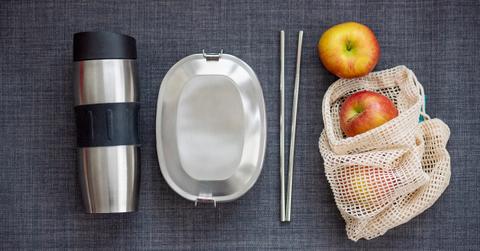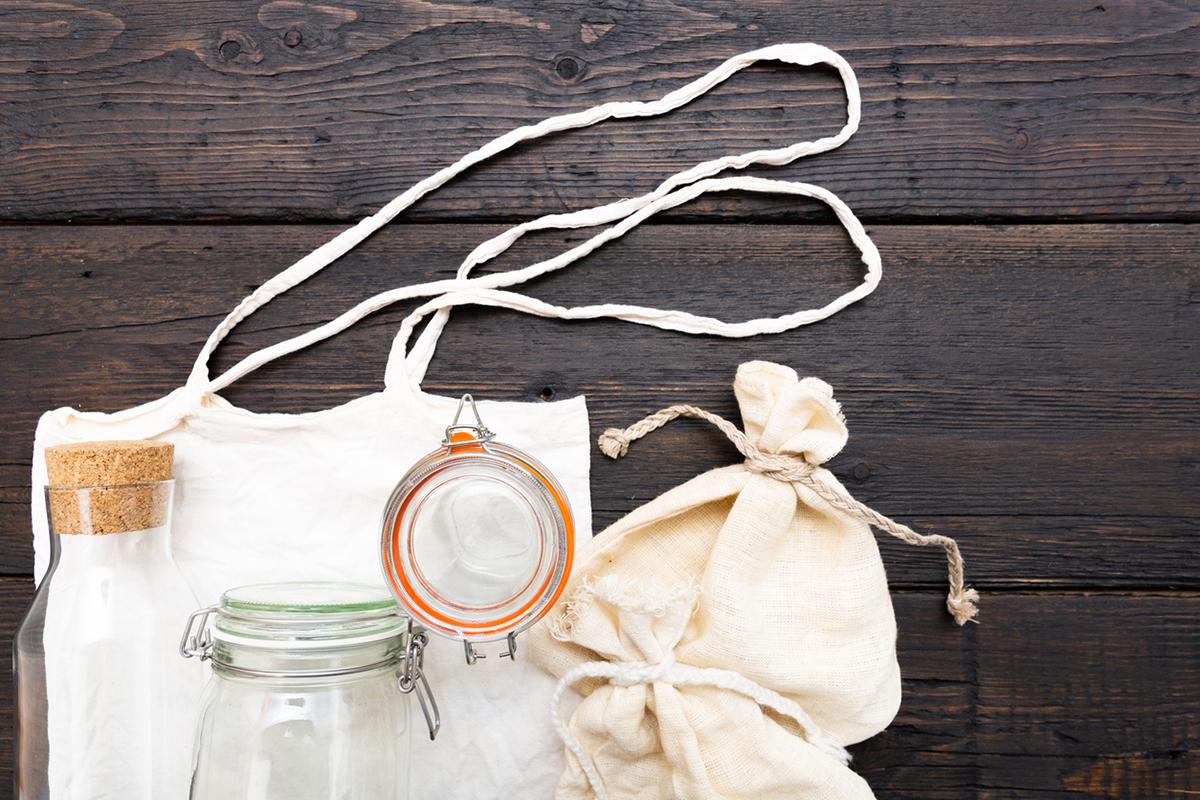How to Talk to Your Friends About Going Zero Waste
The idea of living a zero-waste life may be foreign to your friends and relatives — here’s how to start the conversation.
Updated April 21 2019, 10:52 p.m. ET

Have you met my mother? Joann loves plastic, stores even the smallest bit of leftovers in Ziploc baggies (larger leftovers get mummified in Saran wrap), and she does not believe in flushing toilet paper. Yeah, that’s my mother… Which is just to say that I didn’t grow up around the most eco-friendly philosophies and yet here I am — a passionate sustainability advocate.
The point is not to ostracize my family or put my mother’s kitchen cabinet of Styrofoam plates on blast; it’s to exemplify that we all have different lifestyles. And while I choose to live mine as minimally and waste-free as I can, it can’t be my sole prerogative as a daughter to eco-shame or change my family’s ways.
Though I can certainly try to bring them to the green side.
This was hard to come to terms with at first. I don’t come from a family of fellow zero wasters — though my sister and her husband (who live next door) do practice some sustainability techniques associated with farm life (like raising chickens, composting food scraps, and homesteading). But mostly, it’s just me recycling plant-based plastic through Terracycle and shampooing my hair with a shower-safe paper bottle from Seed Phytonutrients.
So, imagine my surprise when my mom bought me a konjac black sponge and silicone Stasher bags for Christmas last year. I was like, “What?! Zero-waste things?” and she was all, “I may not get it, but I pay attention.”
I’m the black sheep and maybe you are, too. If any of your friends or family members don’t understand what your being zero waste means, here are some tips on how to handle the convo, straight from a person who has had it herself.
Set clear but reasonable boundaries
This is perhaps the hardest thing to do with a family and friends who don’t understand your lifestyle. But the fact of the matter is, if they choose to ignore your wishes and continue buying you plastic and other things you’re just going to throw away, that’s wasteful. You can bring up a discussion while still being constructive and polite. Try saying something like, “No thanks, I wouldn’t use that.”
My mom’s favorite thing for a long time was picking up Ziploc bags for me whenever she hit up the grocery store. That and toilet paper. I finally told her thank you, I appreciate the gesture, but I use these alternative options instead. (Stasher bags and a bidet, if you’re wondering how I cut those two things out!) It was hard to believe at first but eventually she realized it wasn’t helpful; for my specific lifestyle, it was only creating more unnecessary waste.

Explain what zero waste means to you, emotionally
As people who care about sustainability, we’re always going to face some annoying stigma that’s attached to our advocacy. We’re tree huggers or whatever. (As if that’s a bad thing?) But I digress. I’ve found in my personal discussions with friends and family that emotion is the key to accessing their understanding. What does sustainability mean to you and why do you do it? Don’t just list statistics at them; while the data is true, people often only hear what they want to.
When talking about the choice to be as zero waste or low impact as possible, try to be genuine. Showing your passion for this movement will hopefully exemplify your sincerity. As the most important people in your life, friends and family should understand wanting to support what’s important to you. Even if they can’t understand bidets and compostable toothbrushes, they should be able to understand that this passion means a lot to you.
Provide suggestions
It’s not going to take just one conversation with someone in your life. It’s going to take several. When it comes to little fixes like picking up Ziplocs or toilet paper, that stuff might be fixed more quickly. But for a while after convincing my mother to cease the Ziploc runs, I struggled with gift-giving holidays.
The wrapping paper, the bows, the tape. I still kind of swallow my pride for all that because it makes it fun for my parents and my sister’s children. But even more than the presentation of it all, I struggled with the actual gifts. Small stocking-stuffer things were mostly cheapy, plastic or unnecessary dollar store items I simply didn’t want. It was so hard to convey this message: Thank you, I love the thought of it truly. But I just don’t need this thing.
Providing suggestions could come in handy for this part. “You know what I’d really love for -insert holiday-? I’m in need of a sustainable comforter like the one from Buffy.” Or, “I know it’s difficult to find sustainable stocking-stuffers for me, but I really like this one brand of sustainable makeup.” Etc, etc, etc.
Talk about what you like
Which leads me to the next point of talking about what you like. It’s unrealistic to expect a family member or friend to hear your concern about sustainability and then on their own, do all the work. If you like a certain Whole Foods brand or have your eye on t-shirts from Wholesome Culture, then talk about it! Chances are the next time they’re at Whole Foods, they’ll see that soap brand and remember it’s your favorite; if a Wholesome Culture ad pops up on their Facebook, they’re going to remember, “Oh, she wanted that tee!” Expressing what you want and like is sometimes the fastest route to getting it.
Buy them some zero waste stuff, too
Listen, I’m not saying to force your mother to start composting or pay for an alkaline water filtration system to be put in her house; I’m just saying sharing the wealth couldn’t hurt. “Have you tried this makeup company? They make sustainable products that are completely devoid of nasty chemicals and parabens.” Or, “I bought you this silicone sponge; I saw you were using an old dirty one and these last so much longer.” I’ve converted a lot of people this way, simply by sharing my favorite sustainable products and letting them fall in love with them on their own.